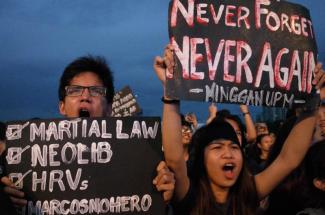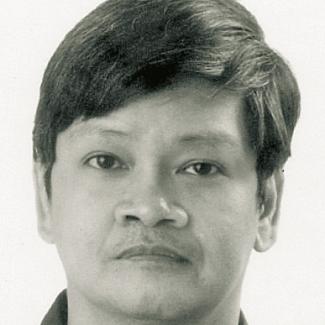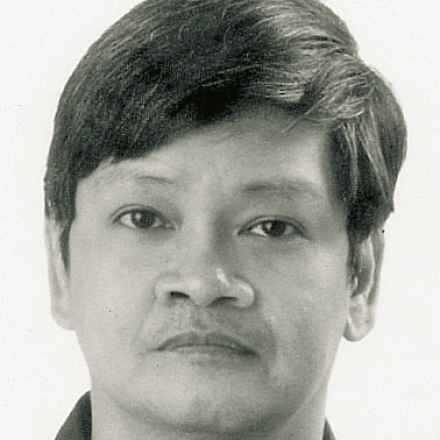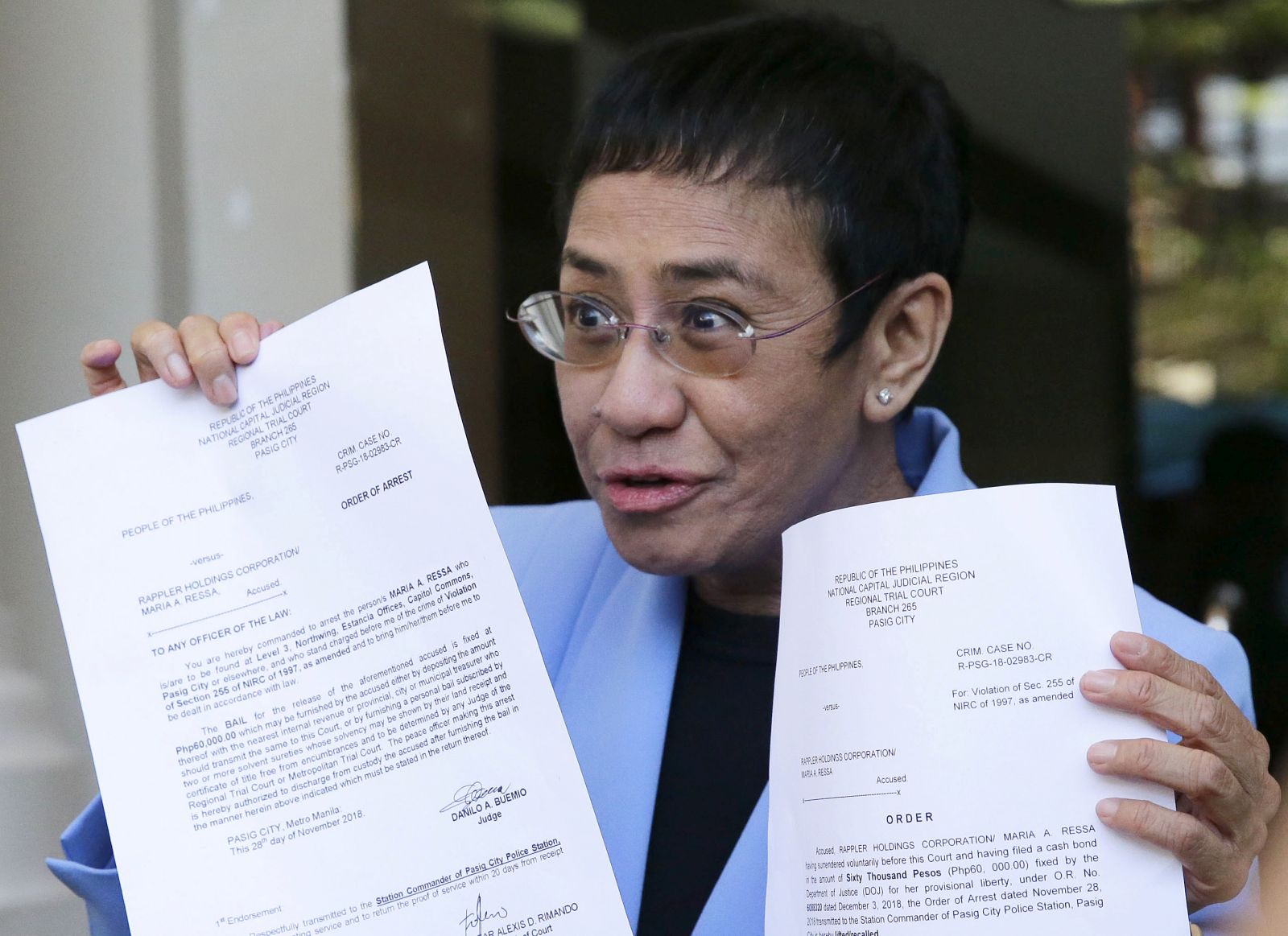Extrajudicial killings
National suicide

The death count is currently at 6,000 and still growing. Not one murderer has been brought to justice. Meanwhile, Congress is working on restoring the death penalty and lowering the age of criminal responsibility to nine years. There is talk of allowing security forces to detain people without judicial mandate, changing the constitution and giving the president emergency powers.
In May, Duterte won the presidential elections. Of 41 million voters, almost 17 million opted for him. Mar Roxas, who came in second, got 10 million votes.
During the campaign, Duterte warned that the country was being engulfed by crime and illegal drugs, so drastic measures were needed. He showed contempt for human rights. “God will weep if I become president," he said, promising to fill Manila bay with the corpses of tens of thousands of criminals and drug addicts. The former mayor of Davao City had a reputation of ties to death squads.
Far from being appalled, millions of Filipinos lapped up his murderous diatribes. He apparently appealed to a latent sense of anger, which is probably linked to poverty, inequality, corruption and policy failures. The Philippines is nominally a democracy, but “trapos”, the members of oligarchic families, dominate political life. Duterte is not one of them, railed against them, but, once in office, aligned himself with them.
Duterte’s campaign used Facebook aggressively. His followers spread his messages and fake news, belittling other candidates and intimidating critics.
Duterte promised to end crime, erase government corruption and smash rice smuggling within six months. Of course he did not do so. His achievements so far are involving the Communists in his government, pivoting away from the west towards China and Russia and burying the remains of former dictator Ferdinand Marcos at the National Heroes Cemetery. Masses of protesters were appalled that the autocrat who exploited the country in the 1960s, 70s and 80s was honoured this way.
Duterte’s war on drugs seems to consist of a single policy: eliminating suspects and anyone who gets in the way. The Philippines has a history of extrajudicial killings, but the current, almost industrial scale is unprecedented. Reporters are now staying at Manila police stations overnight waiting for reports of corpses. In the daytime, people gather to look at bullet-ridden corpses on the streets.
When Duterte took office in late June, the police urged drug addicts to turn themselves in. Hundreds of thousands did, but they were sent away after their names and addresses were noted. Soon, many people on those lists were dead, killed by “tandems” consisting of two assassins on a motorcycle (see box). The president has said he does not like spending money on drug treatment, indicating that his goal was always extermination, not rehabilitation.
The list of atrocities is long. A mother of two was called out of her house and gunned down in the street. A teenager died in a hail of bullets only because she was sitting in the same public vehicle as a suspect. Most victims are poor people, some are reformed addicts who kicked the habit, and some are mere bystanders. Even children have died. Duterte shrugs them all off as “collateral damage”.
Nazi-like language
The president seems to distinguish Filipinos from drug addicts, a lower life form. “I’d like to be frank with you, are they humans?” he has asked. He expressed the wish to kill 3 million of them. His talk is Nazi-like, and Duterte has indeed spoken favourably of Hitler. His trademark salute - a clenched fist at the end of a horizontally extended right arm – is just a few degrees shy of a “Heil Hitler”.
About a third of the deaths so far are officially ascribed to the police, who routinely report shooting “resisting” suspects. The rest of the carnage is officially blamed on “drug syndicates”, but it is quite obvious that the death squads are cooperating with the security forces. The killing began after Duterte’s election, after all.
When an anti-crime activist was murdered in Mindoro last year, two masked assassins were caught. They turned out to be senior police officers, one was wearing a wig, the other a ski mask. Another blatant case involved a mayor whom Duterte called a drug dealer. The mayor was jailed and shot dead in a cell by a team of 20 police officers who burst in, forced the guards to stand aside and then started shooting. The police shooters said the mayor was “resisting”. Duterte says he’ll stand by the killers.
According to news reports, death squads have long lists of “suspects”. Apparently, police chiefs have been given quotas of killings, and they are putting pressure on local governments to provide them with names. There are accounts of innocent people ending up on such lists.
This war on drugs is marked by inequality. The poor die, while the rich and connected get away or aren’t touched at all. The grandson of Duterte’s political ally, Gloria Arroyo, was immediately released after being arrested for possession of illegal drugs. Had he been poor and unconnected, his body would most likely have been found on the street.
The war on drugs is based on flimsy premises moreover. There is not much evidence for Duterte’s claim of the country becoming a “narco-state”, Amnesty International has argued: “The Philippines has a low prevalence rate of drug users, compared to the global average, according to the United Nations Office on Drugs and Crime.”
At any rate, the president has turned his strongman image into political capital. The legislative branch of government is all too eager to please him. After thousands of murders, Congress still will not acknowledge there is such a thing as extrajudicial killing. When a whistleblower admitted he was an assassin working for Duterte during a hearing, senators belittled him. Members of Congress, moreover, harass legislators that dare to oppose the president.
On the campaign trail, Duterte vowed to sweep away the oligarchy and only pick the “best and brightest” to serve in his administration. Yet once elected, he appointed cronies, supporters and sycophants. He is now allied with the elite and has revealed close ties to the Marcos and Arroyo families. Ferdinand Marcos jr. should succeed him, Duterte has suggested, though of course the former dictator’s scion has not won an election. Duterte’s rule is more murderous, but otherwise not much different from previous administrations.
Striving for unlimited power
One difference matters however. Duterte made peace with the Communists. It suits his intention to change the constitution and establish a government that gives him unlimited power. He is already undermining the constitution by using executive orders. Ominously, he wants to revive the Philippine Constabulary (PC), a militarised police force that was set up by the USA in 1901 to enforce colonial hegemony. Under Marcos, the graft-ridden, incompetent PC was feared because of murder and torture. It was disbanded in 1991, five years after the people’s power movement toppled the dictator.
Shabbily dressed when meeting world leaders, Duterte is happy to curse them (unless they are Chinese or Russian) and chew gum (allegedly to deal with pain which he is taking medication for). He taught the world curse words in Tagalog, devaluing protocol and etiquette.
Duterte’s words put him beyond satire. He has said he’d gladly eat terrorists “with a little salt and vinegar”. The president boasts of having murdered at least three people and admits planting evidence on suspects when he was a prosecutor.
Depressingly, masses of Duterte supporters are still enthusiastic. To judge by their social media accounts, they tend to be members of the struggling middle class or overseas workers. For an illusive sense of security, many Filipinos now look set to welcome an even more murderous version of Marcos, the autocrat, who was chased out in 1986. With doubt cast on the country’s foreign policy, constitution and political future, the Philippines will not become a model of stability any time soon. It is, however, an example of atrocious, state-sponsored violence.
Alan C. Robles is a Manila based journalist.
editor@hotmanila.ph











